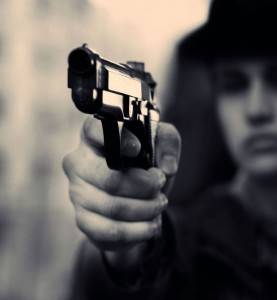Can You Draw Weapons on a Charge
Brandishing a Weapon, Gun or Firearm: California Penal Code 417
Brandishing a Weapon Definition
Under California Penal Code 417, it is unlawful for you to draw or exhibit a deadly weapon in a rude, angry, or threatening way in the presence of another person and not in self defense or in defense of someone. If you unlawfully use a deadly weapon in a fight or quarrel that is also considered brandishing a weapon under the law. The sentencing and punishment for brandishing of a deadly weapon in California can be severe, and you need an experienced attorney to guide you through this critical legal process.
What is a deadly weapon in California?

A deadly weapon can be anything from a firearm to a baseball bat or even a bottle and is defined as "any object, instrument, or weapon that is inherently deadly or dangerous or one that is used in such a way that it is capable of causing and likely to cause death or great bodily injury."
Prosecution for a charge of brandishing a deadly weapon in California
In order to convict you of brandishing a deadly weapon, the prosecution must prove each of the following beyond a reasonable doubt:
1. You possessed a deadly weapon as defined by law, and
2. You drew or exhibited the weapon in a rude, angry or threatening manner in front of someone else, or
3. You actually used the weapon unlawfully in a quarrel or fight with someone, and
4. You were not acting in self defense or in the defense of someone else
Defenses to a charge of brandishing a weapon
There are a number of defenses to charges of brandishing of a weapon in California that a criminal defense lawyer at Wallin & Klarich can raise on your behalf. Your attorney can argue:
- You acted in self-defense, or in the defense of someone else
- You were exhibiting the weapon to someone in a non-threatening manner
- You did not exhibit a deadly weapon, as defined in the law, in someone's presence
Each of these defenses can be raised depending upon the facts of your individual case. Be sure to consult a knowledgeable California weapons charge attorney at Wallin & Klarich to learn more.
Brandishing a weapon sentencing and punishment
Under California Penal Code 417, brandishing a deadly weapon other than a firearm is a misdemeanor punishable by at least 30 days and up to one year in the county jail. However, there are several circumstances that can increase your sentence beyond this range:
- Brandishing an unloaded firearm (PC 417(a)(2)(A)): If you use an unloaded firearm such as a pistol or revolver to threaten someone in public, the sentence increases to a minimum of 90 days and up to one year in county jail and/or a fine of up to $1000.00.
- Brandishing a loaded firearm (PC 417(b); PC 417.3) In certain cases, if you threaten someone with a loaded firearm, you can be charged with a felony and you could face from 16 months to 3 years in county jail.
- Brandishing a weapon or firearm causing serious bodily injury (PC 417.6(a)): If you intentionally injure someone during the commission of the crime of brandishing a weapon, you may be additionally charged with a misdemeanor, punishable by up to one year in the county jail, or with a felony, punishable by up to 3 years in county jail.
- Brandishing a firearm in the presence of a peace officer (PC 417(c)): If you threaten a peace officer on duty with a firearm you may be charged with a misdemeanor, punishable with a minimum of 9 months in the county jail, or charged with a felony and could face 16 months to 3 years in county jail.
- Brandishing a firearm with intent to resist arrest (PC 417.8): If you attempt to resist arrest or help someone else to resist arrest by brandishing a firearm, you can be charged with a felony, punishable by 2, 3 or 4 years in county jail.
California Brandishing a weapon FAQs
To help you understand the various aspects of a PC 417 charge, our attorneys at Wallin & Klarich have provided answers to some of the most commonly asked questions pertaining to brandishing of a deadly weapon or firearm charges in our FAQ section. There, you can find answers to questions like:
- Is brandishing a deadly weapon charged as a misdemeanor or a felony?
- Can I be convicted of brandishing a firearm even though I used a fake gun?
- What happens to the weapon or firearm if I am convicted?
- Where can I find the best criminal defense lawyer to represent me?

Call Wallin and Klarich Today
If you or someone you care about has been arrested on a weapons charge, it is vital that you contact an experienced criminal defense lawyer at Wallin & Klarich who is familiar with such cases. With offices in Orange County, Los Angeles, San Diego, Riverside, San Bernardino, Ventura, West Covina and Victorville, Wallin & Klarich has successfully represented clients facing weapons charges for over 40 years. We have the knowledge and the experience to help you win your case.
Call today at (877)466-5245 or fill out our confidential form. We will be there when you call.
Can You Draw Weapons on a Charge
Source: https://www.wklaw.com/brandishing-a-weapon-california-pc-417/
0 Response to "Can You Draw Weapons on a Charge"
Post a Comment